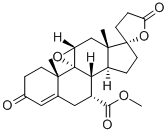Pharmacology and Side Effects of Eplerenone
Aldosterone, the final product of the renin-angiotensin-aldosterone system (RAAS), is a mineralocorticoid hormone that classically acts, via the mineralocorticoid (aldosterone) receptor, on epithelia of the kidneys, colon, and sweat glands to maintain electrolyte homeostasis. Aldosterone has also been shown to act at nonepithelial sites where it can contribute to cardiovascular disease such as hypertension, stroke, malignant nephrosclerosis, cardiac fibrosis, ventricular hypertrophy, and myocardial necrosis. Although angiotensinconverting enzyme (ACE) inhibitors and angiotensin type 1 (AT1) receptor antagonists act to suppress the RAAS, these agents do not adequately control plasma aldosterone levels a phenomenon termed aldosterone synthesis escape. Spironolactone, a nonselective aldosterone receptor antagonist, is an effective agent to suppress the actions of aldosterone; its use is, however, associated with progestational and antiandrogenic side effects due to its promiscuous binding to other steroid receptors. For these reasons, eplerenone the first agent of a new class of drugs known as the selective aldosterone receptor antagonists (SARAs) is under development. In rodent models, eplerenone provides marked protection against vascular injury in the kidney and heart.
Cardiovascular Protection
Current studies indicate that aldosterone not only contributes to salt and water homeostasis but also exerts direct vascular effects. Just as Ang II is produced locally in vascular tissue, experimental studies provide evidence for local, extra-adrenal production of aldosterone, and for extra-renal actions of aldosterone. Aldosterone can be synthesized by endothelial cells and vascular smooth muscle cells (VSMCs), and locally in tissues such as the brain, blood vessels, and myocardium. Studies suggest that aldosterone also contributes to cardiovascular toxicity in humans, independent of the effects of Ang II. Clinical studies indicate a correlation between aldosterone concentrations and cardiovascular and renal morbidity and mortality. Patients with primary hyperaldosteronism exhibit endothelial dysfunction, a predictor of future cardiovascular events, compared with patients with essential hypertension. Increased plasma aldosterone concentrations are associated with decreased arterial compliance in hypertensive individuals. Conversely, aldosterone receptor antagonism improves endothelium-dependent vasodilation in patients with congestive heart failure.
Pharmacology of Eplerenone
Eplerenone, like spironolactone, is a competitive antagonist of the aldosterone receptor. Eplerenone, chemically described as Pregn-4-ene-7,21-dicarboxylic acid, 9,11-epoxy-17-hydroxy-3-oxo, γ-lactone, methyl ester (7α, 11α,17α), was derived from spironolactone by the introduction of a 9α,11α-epoxy bridge and by substitution of the 17α-thoacetyl group of spironolactone with a carbomethoxy group (Figure 3). Although eplerenone exhibits 10- to 20-fold lower affinity for the aldosterone receptor in vitro compared with spironolactone,60 studies in humans suggest that eplerenone is 50% to 75% as potent as spironolactone.61 The substitution of the 17α-thoacetyl group confers eplerenone with significantly increased selectivity for the aldosterone receptor over other steroid receptors.
Hypertension
Krum et al64 reported the hypotensive effect of add-on therapy with eplerenone (50 mg increasing to 100 mg) in patients who were already taking an ACE inhibitor (n=177) or an AT1 receptor antagonist (n=164). Coadministration of eplerenone significantly reduced seated systolic blood pressure compared with coadministration of placebo in both the ACE-inhibitor and AT1 receptor antagonist groups. Eplerenone significantly reduced diastolic blood pressure in the AT1 receptor antagonist–treated group but not in the ACE inhibitor–treated group. There was no effect of add-on therapy with eplerenone on heart rate.
Side Effects
Eplerenone is the second oral aldosterone antagonist available in the USA for the treatment of essential hypertension and heart failure. Treatment has been associated with reductions in blood pressure and improved survival (15% reduction in total mortality) for patients with heart failure who are in stable condition after a myocardial infarction. Due to the selectivity of eplerenone for the aldosterone receptor, adverse effects such as gynecomastia and vaginal bleeding seem to be less likely in patients who take eplerenone than in those who take spironolactone. The most severe side effect of spironolactone, hyperkalemia, was also observed with eplerenone. While eplerenone is more selective, with the potential for fewer side effects, its overall efficacy has not been proven to be superior to that of spironolactone in clinical trials. The American College of Cardiology recommends trying spironolactone first and then switching to eplerenone if patients develop gynecomastia, menstrual irregularities, or impotence.
See also
Lastest Price from Eplerenone manufacturers

US $0.00-0.00/g2025-07-31
- CAS:
- 107724-20-9
- Min. Order:
- 10g
- Purity:
- 97.0-102.0%
- Supply Ability:
- 50kg/month

US $5.00-0.50/KG2025-05-30
- CAS:
- 107724-20-9
- Min. Order:
- 1KG
- Purity:
- 99% hplc
- Supply Ability:
- 500TONS
